14 Proven Tips for Writing an Agricultural Grant (that actually work)
In this article, we will give you 15 proven tips that help you get an agricultural grant.
When we’re finished, you’ll have the tools you need to write an effective grant proposal so you don’t look like a rookie and can land the grant you want.
But before we get started, make sure to read our other blog post: “Which Type of Agricultural Grant is Best For You?” You can gain knowledge on all the groundwork you need — things like:
- An overview of the major types of grants (so you know which one to pursue)
- A list of private organizations that offer grants.
- The first steps in getting started with a grant.
Now, let’s get you started on putting grant money in your pocket!
Grant Writing Requirements
Beginning farmers and first-time grantees often share a common question:
“Are there any requirements that I have to meet when I apply for a grant?”
The simple answer is “yes”. But it’s important to understand that there is no standard set of requirements that apply to all grants. Rather, each grant for farmers has its own set of requirements.
In fact, criteria can be as granular as page length, typeface, and page margins.
Other instructions include questions to answer and attachments to include in your submission. It’s unnecessary to send more than what is requested, even if you think it will win you an advantage.
At the end of the day, here’s what you need to remember:
- Each grant has its own set of requirements and instructions.
- Follow these instructions to the letter. Answer questions in the order they are listed, use the funder’s headings and terminology and complete the forms they provide. No more and no less.
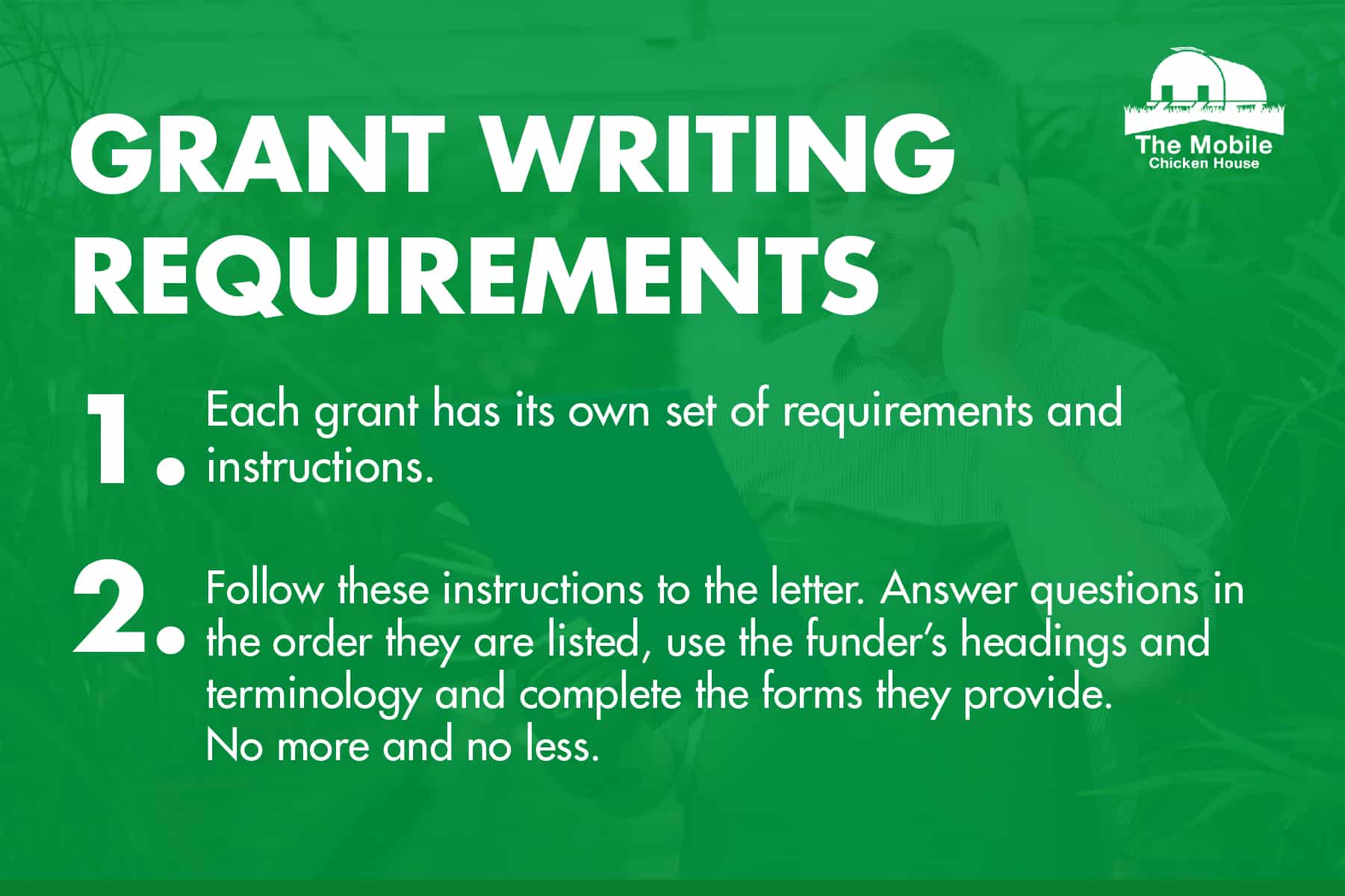
When you do this, you ensure that your grant request is not immediately rejected and prove that you can follow directions. Reviewers can also see that you are capable of completing reports and other follow-up items after you are awarded the grant.
14 Tips to Writing A Successful Agricultural Grant Proposal
Following instructions when writing a grant application is important – but a successful grant proposal takes more than that.
Let’s dig into 14 tips that will help you land a grant for your farm!
1 - Do Your Research
As a busy farmer or rancher, you know that time is money. Each moment you spend away from your land or animals is precious time.
That’s why it’s essential that you do thorough research on a grant before spending the hours of time it takes to create a good application.
In particular, make sure you answer the following questions:
- Are you eligible for a grant?
- Does the funder have specific grant making priorities?
- If there is a geographic focus for the grant?
For example, you’ll find that the Frontera Farmer Foundation offers grants to those pursuing organic farming.
“Great!” you think. “I’m an organic farmer!”
But read closely – the Frontera Farmer Foundation only offers grants to those who sell their food to customers in the Chicago area. If you apply for this grant as an organic farmer living in another part of the country, you will have wasted your time.
If an email address or phone number is provided, don’t be afraid to contact the funder to ask if your project is a good fit for funding. It won’t hurt your application to ask, and it helps you make a personal connection.

2 - Start Small and Early
While this particular tip doesn't directly involve how to write a grant proposal, it should help you to understand when it's time to start working on these proposals.
To increase your chances of receiving grant money, it's highly recommended that you start small and early, which is particularly important if you've never applied for a grant before.
While some farmers and ranchers attempt to go for the largest grants that allow them to receive a substantial sum of money, this strategy isn't feasible if it’s your first time applying for a grant. Instead, you should focus on securing several small grants at the beginning.
Applying well before an individual grant deadline also allows extra time if you have questions or need to locate documents.
For example:
- You might need extra time to shop around and nail down the expenses in your budget.
- You might encounter technical difficulties that you didn’t anticipate.
Plus, starting early allows you to contact the funder in advance if you have questions about the application or guidelines.
3 - Tell a Story
Imagine that it’s your job to read grant proposals, hour after hour after hour. Eventually, they all sound the same—unless you come across one that inspires you or tugs at your heartstrings.
This is why you must tell a good story with your grant proposal.
In particular, make sure to include two elements:
- A real problem you or your community is facing
- A feasible solution to the problem
Most humans don’t take action in life unless they face an obstacle. If your grant reviewer feels like you are tackling a real problem, they will be drawn into your story and want to help!
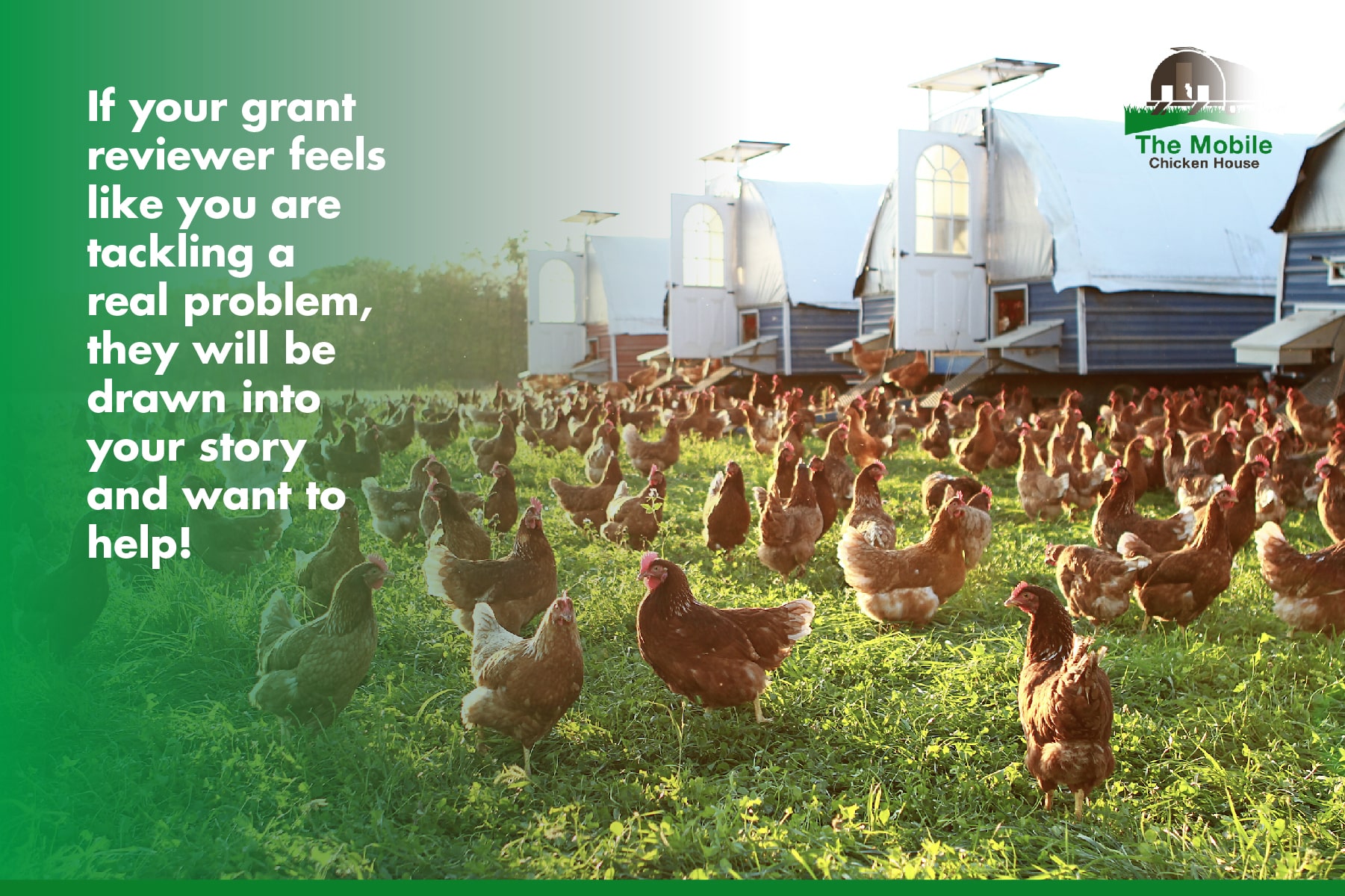
However, if you only describe the problem and don't offer a solution, the reviewer may be tempted to think that you cannot solve the issue. So, make sure you clearly state how the money you receive can help resolve the problem you are facing.
Just remember that there is no need to get long-winded or over dramatic in your story. Keep it short, concise, and compelling.
4 - Create a Timeline
Do you remember those research papers in high school or college that weren’t due until the end of the semester? If you didn’t create a timeline to keep yourself on track, everything ended up happening in the last couple of days – and usually, the grade reflected that!
An agricultural grant follows the same principle.
In fact, we recommend that you take at least a month to write your grant proposal. In our experience, numerous drafts and edits are essential to writing an effective proposal.
That’s why we highly recommend creating a project timeline.
A timeline maps out the tasks that need to be accomplished and makes them seem less overwhelming. Just give yourself adequate time to gather your documents and information and develop your proposal.

5 - Seek Out Examples of Previously Funded Projects
Have you ever heard the phrase “There’s no need to reinvent the wheel”?
The idea is that there is no reason to waste time or effort creating something that already exists.
Thankfully, you can leverage this same principle in grant applications.
We recommend that you look at projects the funder has awarded grants to in the past. This gives you an idea about the types of proposals they have historically favored and sheds light on how to best frame your proposed project.
Where can you find previously awarded grants?
Many foundations list grantees in their annual reports and sometimes highlight projects of particular interest. For example, Food Animal Concerns Trust provides information on all the funded projects and farms online. The Organic Farming Research Foundation also lists its past grants in its research grant database.
6 - Create an Outline
Once you’ve determined that you are eligible for a grant and have a project in mind, start to outline what you want to address in your proposal.
This helps you organize your thoughts and be intentional about presenting your proposed project.
Also, note that some lenders tell you exactly how they want you to structure your proposal, in which case you should follow that outline.
If you don’t receive specific instructions from the lender, make sure you include these sections in your outline: introduction, information on the need and goal of your proposed project, budget, and a conclusion.
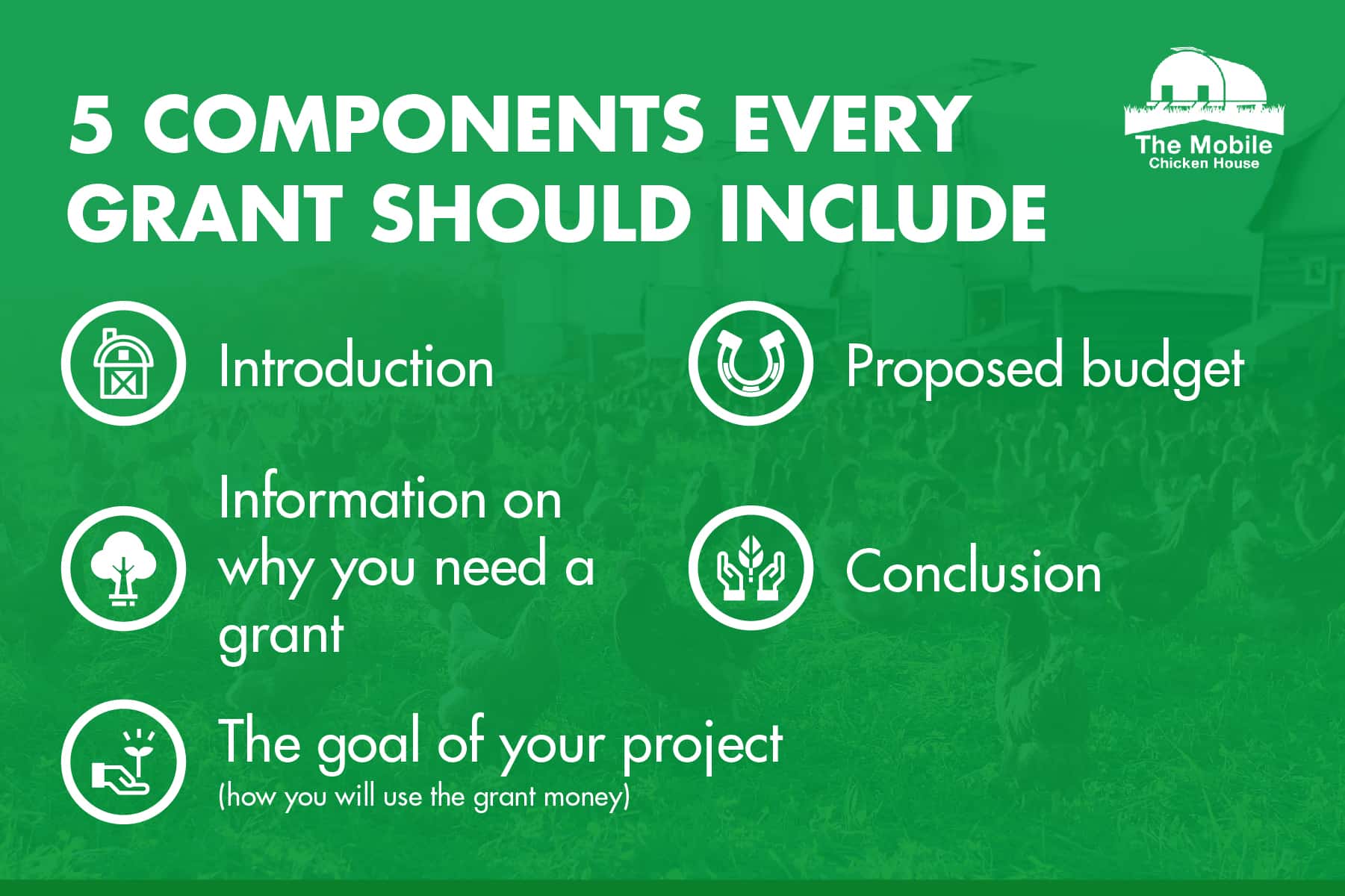
We want to make this as easy as possible for you… so, here’s an outline template you can follow to get started.
- Introduction
- Brief statement introducing your farm
- Summarize why you are applying for funding
- Proposed Project
- Convey the need or challenge addressed by your project
- Explain your project goals
- Describe the steps you will take to implement the project
- Provide a timeline for completing the project
- Describe the experience, expertise, and training you have to complete the project
- Explain how you will evaluate the success/effectiveness of your proposal
- Address any other requirements of questions set forth by the funder
- Budget
- Conclusion
- Summarize the need, project, goals, and intended outcomes. How will a grant make a difference to your operation?
- Make a connection between the funder’s goals and your project, articulating how funding will help the funder meet their goals as well
- Thank the funder for considering your application
7 - Clearly Identify the Project Need
It’s essential that you thoroughly yet succinctly explain why you need to undertake your project.
Are you implementing it to address a specific issue related to your animals? Maybe it’s your land or business or water quality.
Also, describe the steps you will take to complete your projects as concretely as possible and give dates for the expected completion of each step. This proves that you’ve thought about your project and what's involved.

Another reason to specifically state your need is that most grants are awarded to a singular cause as opposed to general support.
For instance, if your farm is centered around regenerative agriculture, you could seek funding to develop a pastured poultry system.
8 - Make Your Outcomes Measurable
Imagine your neighbor walks over one day and asks for $100. He claims he can boost community spirit with the cash. But when you ask for details, it turns out he might only be able to help himself – and even then, he’s not entirely sure how.
Would you give him the money?
Of course not!
Funders also want to know how your proposed project will impact your farm and possibly the community surrounding it.
So, make the case that your project is valuable by providing concrete figures such as the number of animals, the number of acres, or the number of people directly benefiting from the project if it is funded.
However, do not inflate your numbers because if you do receive funding it will make your reporting more difficult.
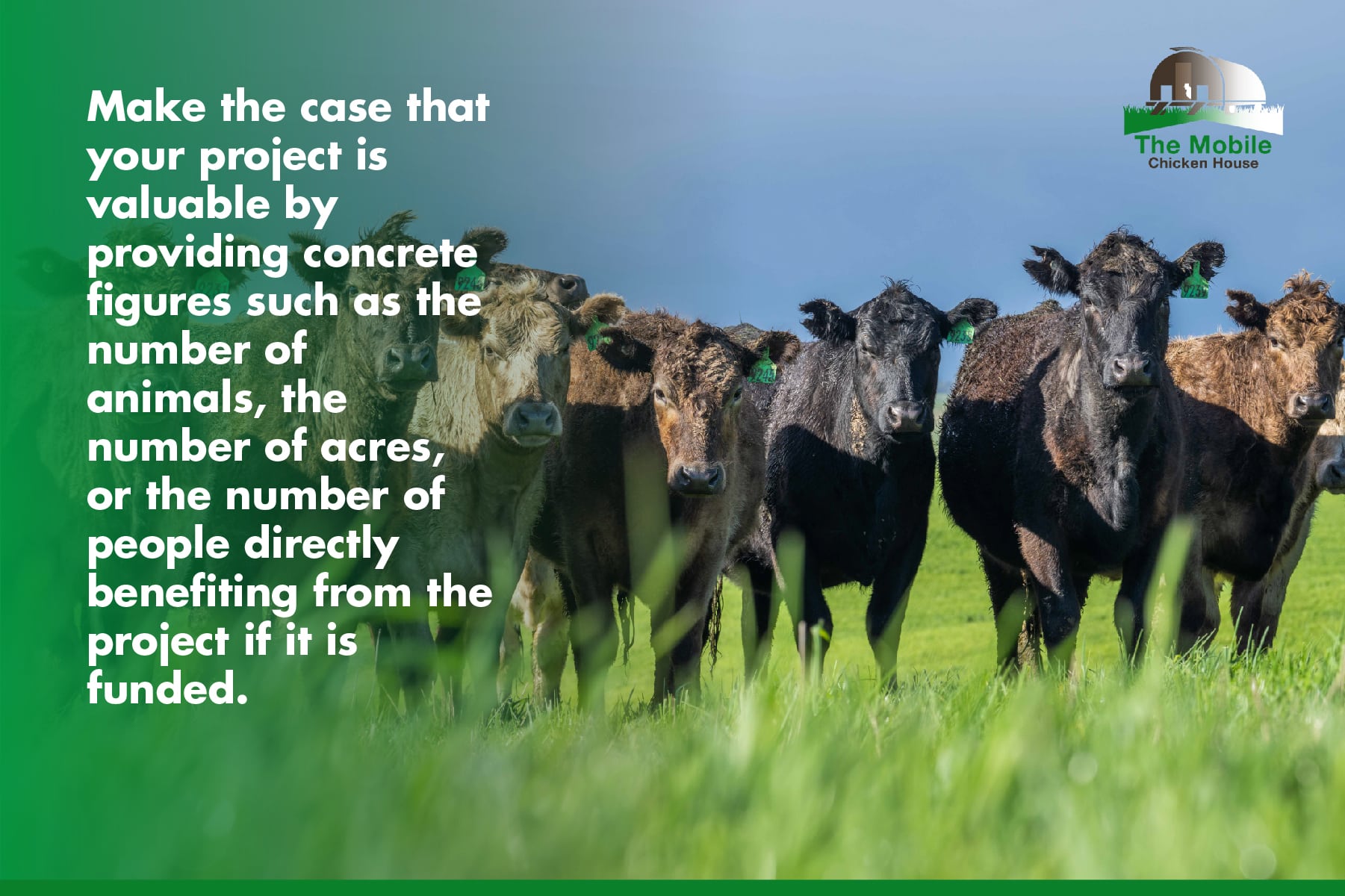
9 - Describe Your Project Within the Funder’s Priorities
You have goals on your farm or ranch – that’s why you are pursuing an agricultural grant in the first place.
But remember, the lender has goals too.
That’s why it’s critical to think about whether your project fits within the funder’s larger mission or vision.
When writing your grant application, you must maintain the integrity of your proposal. Still, it's ok to make a persuasive case by intentionally using keywords, terms, and phrases that you see on the funder’s website and their grant materials.
The more research you do, the more obvious it will be what the funder is looking for and interested in. If you can mirror a funder's vocabulary in your application, it is more likely that they will see a correlation between their goals and yours and, as a result, award you the grant money.
10 - Eliminate Industry Words and Jargon From Your Grant Application
As we said, it’s important to mirror the language and vocabulary that your lender uses – and equally important is not using ambiguous terminology that is only related to your industry.
To appeal to the majority of foundations and corporations, it’s best to eliminate all internally used acronyms and jargon.
Tell your story from the heart, in words that everyone can understand. The best grant proposals are easy to read, concise and understandable.
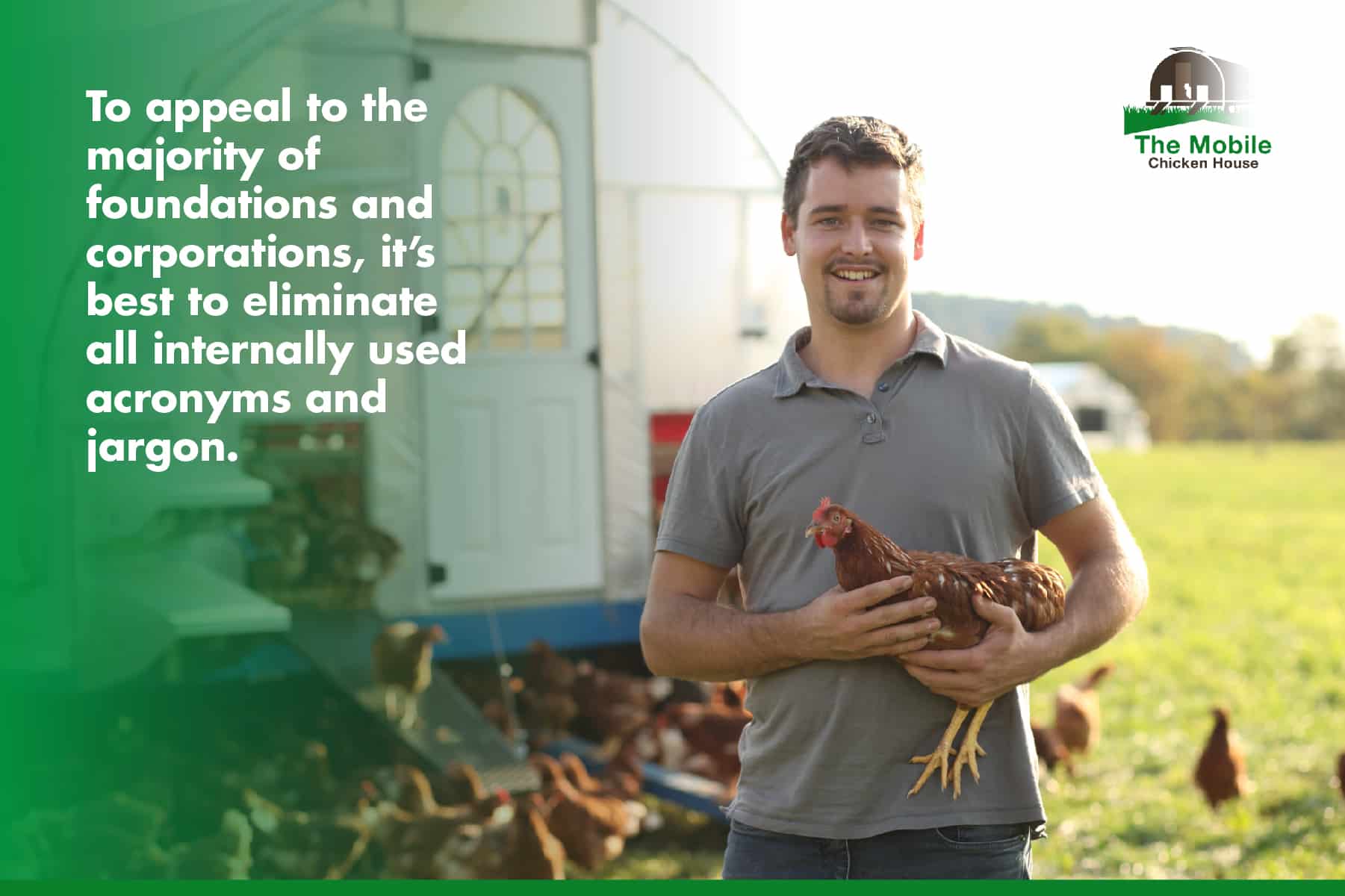
11 - Provide a Reasonable, Honest, and Detailed Budget
Did you know that many organizations that work on behalf of the homeless discourage giving money directly to those living on the streets?
That’s because they want to ensure the money you give is used wisely. If someone has not shown patterns of good money management in the past, they may not be the best person to hand $10 to!
Any lender who offers a grant also wants to confirm that the grantee uses the money wisely. If you can’t prove that you have done your homework and you have a plan for using the grant money, you can guarantee one thing:
You won’t get the grant.
That’s why it’s key to have a reasonable, honest, and detailed budget.
For reference sake, check out the sample budget for an electric fence below:
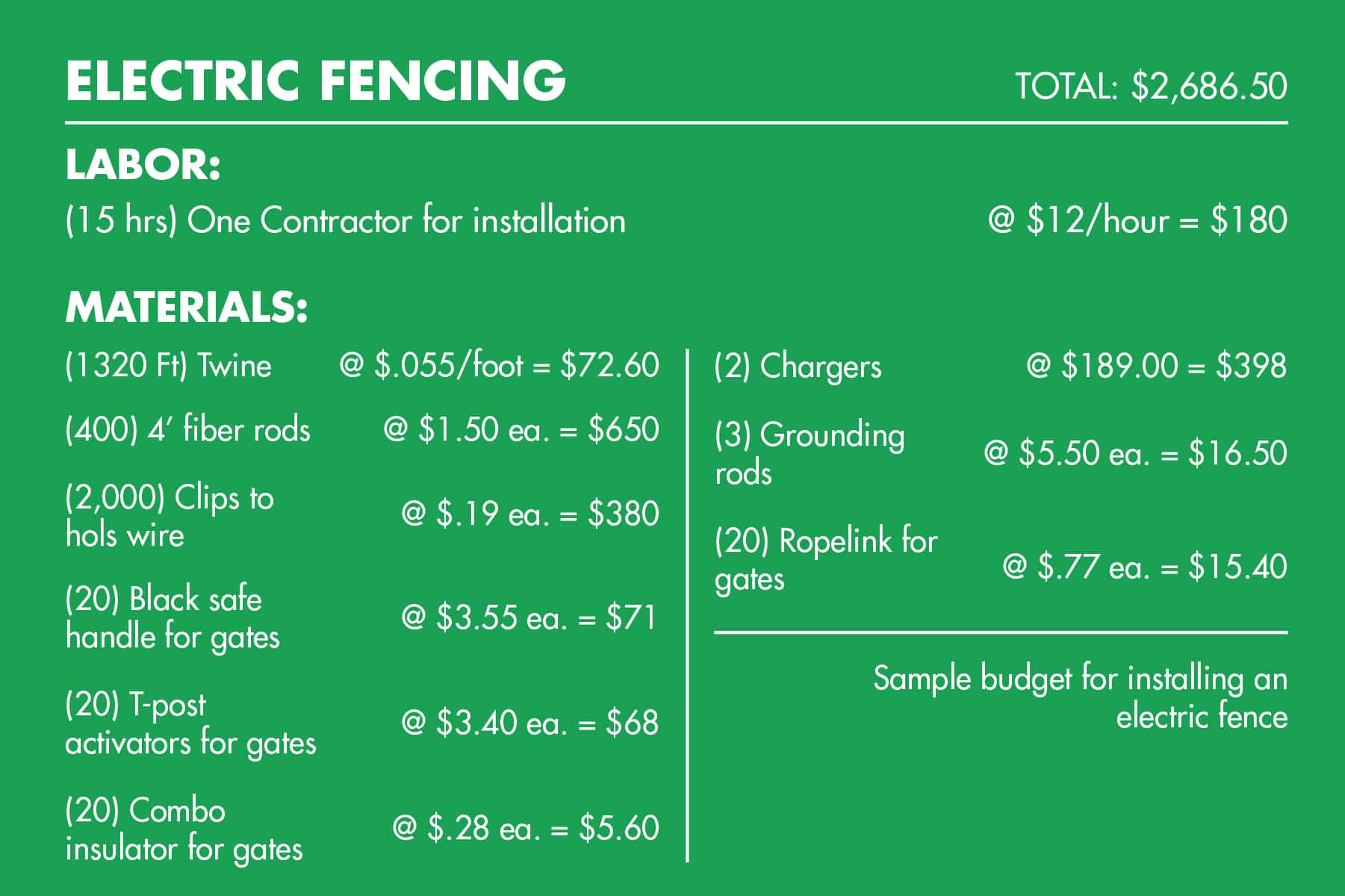
Make sure to justify the numbers you provide just like you would do for any other project you are undertaking on your farm or in your life.
For example, if you plan to hire a contractor for a wire fence installation, check around and get real, concrete numbers to put in your budget. If you can’t get an exact quote, research to get as close as possible to the final price. You want to avoid using rough estimates, which can skew your budget and make reporting more difficult.
Suppose you ask for an amount of grant funding that's far larger than the amount of money that's needed to fulfill your goals. This indicates that you don't manage money well, which will lead to the application being rejected immediately.
When you’re finished, double-check the budget to make sure that it matches the amount of grant money you're requesting. Many proposals are actually submitted with incorrect math, which typically causes an automatic rejection.
12 - Get an Outside Opinion
Before sending your grant proposal, ask a friend, colleague, or family member to read your application and request feedback on grammar, content, and clarity.
They may catch typos or identify larger issues that need to be addressed. It’s also helpful to share some of the grant requirements (like eligibility criteria) with the reader, so they know what to look for.
13 - Contact the Funder Before Sending Grant Application
The funders who are going to be reading your proposals are people, which is why we recommend that you contact these individuals to build a relationship with them before sending in the proposal.
Even if email is an option, it can be much more effective to pick up a phone and call them.
These individuals can help you send in a better and more effective proposal, which is why you'll benefit from talking with the funders and connecting with them.

14 - Improve Your Next Application By Asking for Feedback
It’s true that grants are often very competitive. Usually, there is more interest than there is money available.
If you aren’t chosen, ask for feedback on why you weren’t chosen – then use that constructive criticism to write a new draft and apply again for that grant or even another grant.
Conclusion
Grants are highly popular among the farming and ranching community, which means that your attempt to receive grant funding will be met with heavy competition.
If you want to increase the chances that your grant proposal is accepted, it's vital that the proposal is written well.
And now, you have the tools to do that!
At The Mobile Chicken House, our mobile coops have been utilized by grant winners to create sustainable farms. Plus. we offer many different styles and sizes of coops to meet your needs:
- Mobile coop that houses 300 chickens
- Mobile coop that houses 650 chickens
- Mobile range coop for 250 chickens
- Mobile range coop for 600 chickens
Our coops are solar-powered, have automatic lights, nests, food and water systems, and a custom egg gathering system. Plus, they give hens true access to fresh pasture every single day.
The results are amazing: happy, healthy birds, higher egg production, lower labor costs, and healthier soil.
And the best part? Working with us is easy. All you have to do is:
- Get a quote: Select the options you want and receive your custom quote.
- Place an order: Schedule your down payment and reserve your mobile chicken house
- Experience the difference!
Check out all our chicken house features and get a quote today. We look forward to hearing from you!


